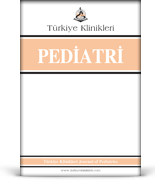Objective: Baby Friendly Hospital Initiative (BFHI) programme was developed to train health workers, to promote and support breastfeeding. Healthcare providers play a key role in the beginning and continuity in breastfeeding. This study was carried out to determine the knowledge and awareness of health workers about breastfeeding and BFHI. Material and Methods: This descriptive study was carried out in 4 different hospitals among health workers (residents, nurses, midwives and specialized physicians). An interview with a structured questionnaire was applied to health workers via face to face. Results: Of 269 participants, 143 (53.1%) were residents, 72 (26.7%) were nurses 54 (20.0%) were specialized physicians. Of all participants 39.3% had training on breastfeeding at their institution. Almost half of the health workers knew the definition of Baby Friendly Hospital and 21.6% of them knew Code of Marketing of Breast Milk Substitutes. Knowledge about baby friendly hospital initiative and international code of marketing of breast milk substitutes was significantly lower among residents than specialist and nurses. Of all participants, 51.7% felt themselves proficient about breastfeeding. Feeling proficient was significantly high among nurses. Requesting training on breastfeeding was 74.7% among all participants and residents requested training about breastfeeding more than two other professions. Conclusion: Our study showed that most of the health workers did not have proper training about breastfeeding and BFHI. There were significant differences in the level of awareness between professions. Curriculum of the medical schools and in-service trainings of health workers should be improved in relation to BFHI and breastfeeding practices.
Keywords: Breastfeeding; baby friendly hospital initiative; health workers
Amaç: Bebek Dostu Hastane Girişimi programı emzirmenin başlatılması ve sürdürülmesi için sağlık çalışanlarının eğitilmesi için geliştirilmiştir. Sağlık çalışanları emzirmenin başlatılması ve devamında anahtar rol oynamaktadırlar. Çalışmamızın amacı, sağlık çalışanlarının anne sütü ve emzirme hakkındaki bilgi düzeyi ve farkındalıklarını saptamaktır. Gereç ve Yöntemler: Çalışmamız tanımlayıcı bir çalışmadır. Dört farklı hastanede sağlık çalışanları (asistan doktor, hemşire, ebe, uzman doktor) arasında yapılmıştır. Sağlık çalışanlarına yüz yüze görüşme ile yapılandırılmış bir anket uygulanmıştır. Bulgular: İki yüz altmış dokuz katılımcının 143 (%53,1)'ü asistan doktor, 72 (%26,7)'si hemşire, 54 (%20,0)'ü uzman doktor idi. Katılımcıların %39,3'ü çalıştığı kurumda emzirme eğitimi almıştır. Sağlık çalışanlarının neredeyse yarısı Bebek Dostu Hastane kavramını, %21,6'sı Uluslararası Mama Kodu'nu bilmekteydi. Bebek dostu hastane girişimi ve uluslararası mama kodunu bilme oranları asistan doktorlarda, hemşire ve uzman doktorlara oranla daha düşük idi. Katılımcılardan %51,7'si kendini emzirme konusunda yeterli görmekteydi, bu oran hemşirelerde belirgin oranda yüksek idi. Tüm katılımcılar arasında emzirme konusunda eğitim almayı isteme oranı %74,7 idi, asistan doktorların bu konuda eğitim isteme oranları diğer iki gruba göre daha yüksek idi. Sonuç: Çalışmamızın sonuçlarına göre sağlık çalışanları emzirme ve bebek dostu hastane girişimi konusunda düzenli eğitim almamaktadırlar. Sonuçlarımıza göre meslek grupları arasında farkındalık düzeylerinde anlamlı farklılıklar bulunmaktadır. Tıp fakültelerinin eğitim müfredatı ve sağlık çalışanlarının hizmet içi eğitimleri, emzirme pratikleri ve bebek dostu hastane girişimi uygulaması açısından geliştirilmelidir.
Anahtar Kelimeler: Emzirme; bebek dostu hastane girişimi; sağlık çalışanları
- WHO. Breastfeeding. (Date of access: 07.12.2019) https://www.who.int/nutrition/topics/exclusive_breastfeeding/en/
- UNICEF. Breastfeeding: a smart investment. (Date of access: 28.10.2019) https://www.unicef.org/breastfeeding/
- Turkey Demographic and Health Survey. (Date of access: 28.10.2019) http://www.hips.hacettepe.edu.tr/tnsa2013/rapor/TNSA_2013_ana_rapor.pdf
- WHO. Ten steps to successful breastfeeding. (Revised 2018) (Date of access: 28.10.2019) https://www.who.int/nutrition/bfhi/ten-steps/en/
- UNICEF. The Baby-Friendly Hospital Initiative. (Date of access: 28.10.2019) https://www.unicef.org/nutrition/index_24806.html
- Dumas L, Hernandez-Aguilar MT. BFHI news brief: news from the baby-friendly hospital initiative network. J Hum Lact. 2019;35(2):381. [Crossref] [PubMed]
- Gómez Fernández-Vegue M, Menéndez Orenga M. [National survey on breastfeeding knowledge amongst residents in pediatrics in Spain]. Rev Esp Salud Publica. 2019;93:e201908060.
- Anderson AK, Johnson E, Motoyasu N, Bignell WE. Awareness of Breastfeeding Laws and Provisions of Students and Employees of Institutions of Higher Learning in Georgia. J Hum Lact. 2019;35(2):323-39. [Crossref] [PubMed]
- Pound C, Ward N, Freuchet M, Akiki S, Chan J, Nicholls S. Hospital staff's perceptions with regards to the baby-friendly initiative. J Hum Lact. 2016;32(4):648-57. [Crossref] [PubMed]
- Merten S, Dratva J, Ackermann-Liebrich U. Do baby-friendly hospitals influence breastfeeding duration on a national level? Pediatrics. 2005;116(5):e702-8. [Crossref] [PubMed]
- Cattaneo A, Buzzetti R. Effect on rates of breast feeding of training for the baby friendly hospital initiative. BMJ. 2001;323(7325):1358-62. [Crossref] [PubMed] [PMC]
- Burgio MA, Laganà AS, Sicilia A, Porta RP, Porpora MG, Frangež HB, et al. Breastfeeding education: where are we going? a systematic review article. Iran J Public Health.2016;45(8):970-7.
- Fugate K, Hernandez I, Ashmeade T, Miladinovic B, Spatz DL. Improving human milk and breastfeeding practices in the NICU. J Obstet Gynecol Neonatal Nurs. 2015;44(3):426-38; quiz E14-5. [Crossref]
- WHO and UNICEF. (Date of access: 28.10.2019) https://apps.who.int/iris/bitstream/handle/10665/272943/9789241513807-eng.pdf?ua=1
- Okolo SN , Ogbonna C. Knowledge, attitude and practice of health workers in Keffi local government hospitals regarding baby-friendly hospital initiative (BFHI) practices. Eur J Clin Nutr. 2002;56(5):438-41. [Crossref] [PubMed]
- Schanler RJ, O'Connor KG, Lawrence RA. Pediatricians' practices and attitudes regarding breastfeeding promotion. Pediatrics. 1999;103(3):E35. [Crossref] [PubMed]
- Salasibew M, Kiani A, Faragher B, Garner P. Awareness and reported violations of the WHO International Code and Pakistan's national breastfeeding legislation; a descriptive cross-sectional survey. Int Breastfeed J. 2008;3:24. [Crossref] [PubMed] [PMC]
- Aguayo VM, Ross JS, Kanon S, Ouedraogo AN. Monitoring compliance with the International Code of Marketing of Breast Milk Substitutes in west Africa: multisite cross-sectional survey in Togo and Burkina Faso. BMJ. 2003;326(7381):127. [Crossref] [PubMed] [PMC]
- Feldman-Winter L, Szucs K, Milano A, Gottschlich E, Sisk B, Schanler RJ. National trends in pediatricians' practices and attitudes about breastfeeding: 1995 to 2014. Pediatrics. 2017;140(4):e20171229. [Crossref] [PubMed]
- Melin A, Björklund P, Zwedberg S. Pediatrician's experiences of working with breastfeeding: an interview study. Sex Reprod Healthc. 2018;16:218-23. [Crossref] [PubMed]
- Singletary N, Chetwynd E, Goodell LS, Fogleman A. Stakeholder views of breastfeeding education in schools: a systematic mixed studies review of the literature. Int Breastfeed J. 2017;12:14. [Crossref] [PubMed] [PMC]







.: İşlem Listesi